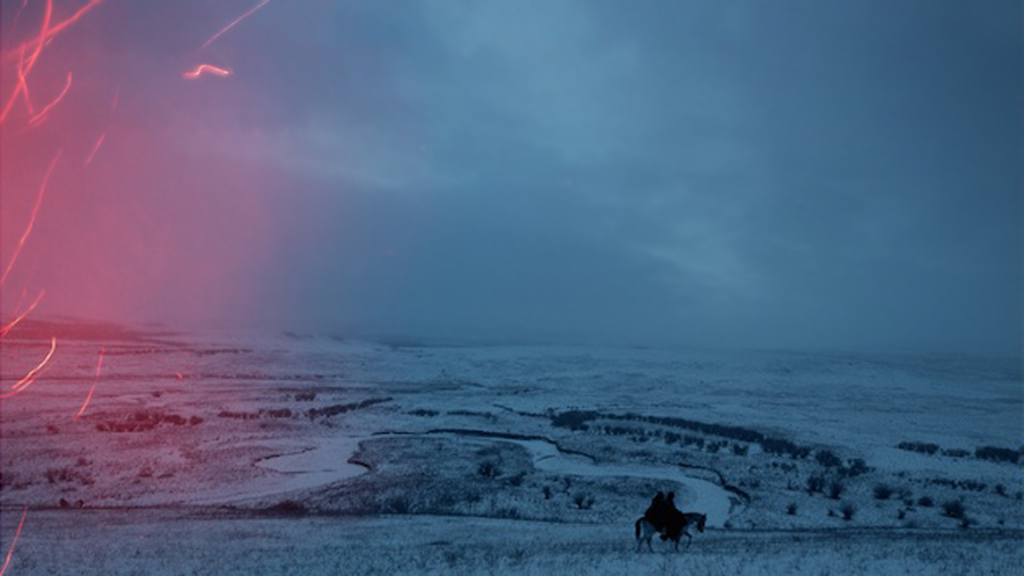
One of the last movies I saw before the New Year was Justin Kurzel’s version of Macbeth. Up to that point, I had never seen something as beautifully crafted and haunting unfold on the screen. The use of music and lighting and color all worked together to heighten the performances of Michael Fassbender and Marion Cotillard in breathtaking ways. That movie left such an impression on me that, as I was walking in to see The Revenant, I tweeted that Macbeth would be my standard for this movie. I wanted to see if Leonardo DiCaprio’s latest theatrical endeavor could leave me as breathless as I was after Macbeth.
It was a tall order, an almost impossible expectation, but I wanted this movie to impress me — and impress me, it did.
As I sat in my seat, watching the end-credits roll, two words floated to the surface of my mind that perfectly summarize The Revenant:
Unrelenting severity.
I don’t think it can be stressed enough — The Revenant is not for the faint of heart. It is a movie that drags the audience down with Hugh Glass (DiCaprio) into the icy depths of hell. One of my college professors described it perfectly: “The Revenant is the most Cormac McCarthy a non-Cormac McCarthy film can be.”
I knew very little about this film as I took my seat. I knew there was some crazy scene with a bear, and that director Alejandro G. Iñárritu and cinematographer Emmanuel Lubezki (who won the Academy Award for Best Cinematography for his work on Alfonso Cuarón’s Gravity) filmed the movie almost exclusively with natural light. I even forgot Tom Hardy was in the film until I saw him appear on the screen! To be perfectly honest, though, I’m glad I knew next to nothing, because this movie gripped me as intensely as Macbeth, if not moreso. From the music, to the characters, to the jaw-dropping cinematic visions of nature, this movie captured the essence of the frontier like nothing I’ve ever seen.
Before I wax too poetic on the visual aspects of this film, I want to make one thing perfectly clear: I don’t think this was DiCaprio’s best role — or even Hardy’s, for that matter. Were they good? Absolutely! There’s no denying either actor’s talent, or the excruciating work they put into this film… but I’ve seen them both do better. Oscar-buzz aside, I was waiting throughout the entirety of the film, hoping to have that awe-inspiring, blood-freezing moment that I usually get from these A-list actors… and that moment never really happened. The closest it came was during the last 10-15 minutes of the movie, and even then it had less to do with performance, and more to do with the setting. It’s a shame, really, because I wanted this to be DiCaprio’s career-defining role, and I wanted to see Hardy unleashed on-screen. The potential for brilliance was there, but it just missed the mark.
However, I will concede this: perhaps The Revenant was crafted in such a way that DiCaprio and Hardy’s characters weren’t designed to be “characters” — or at least not the main character. I’m being honest when I say that I felt lost in the film’s frozen hellscape. I alternated between shrinking back in my chair and sitting on the edge of my seat as I watched the story unfold and witnessed Hugh Glass’ journey into increasingly alarming situations, nearly all of which he was thrust into by the nightmarish force of nature.
If there is any main character in this film — antagonist or otherwise — it is the wildly unbridled wilderness that is captured so perfectly by Iñárritu and Lubezki. The dichotomy of beauty and savagery they’ve managed to strike while using nothing more than natural light is nothing short of miraculous. One minute you’re gaping in wonder at an almost unreal vision of nature, and the next your wonder turns to horror as that same beautiful vision nearly rips Hugh Glass apart. This happens again and again, and each time the savagery intensifies to such an unrelenting degree that you don’t think you can handle much more… and then it pushes you further, forces you deeper into the harrowing narrative.
As a result, the human characters in this movie feel slightly less important. You’re not worried about their development as much as you are concerned about their survival. That’s not to say the human drama is lost; it is very much present throughout the film, and DiCaprio does an outstanding job relaying emotion to the audience, but his performance is overpowered by the unrelenting presence of the elements.
It’s this singular aspect of the film that makes me think these characters are purposefully muted, because there is no stand-out performance. These actors aren’t portraying heroes and villains. They are struggling to exist within the harshness of the frontier, as any normal person would have done in such a time and such a place. In short, they feel real, and their struggle is made all the more visible by a camera that’s not afraid to get right up next to the actors and follow their journey, making it feel like you’re following along right beside them. It’s a technique that startled me at first, but one that I grew more and more fond of as the story progressed (one of my favorite moments is when the camera “zooms” in on DiCaprio’s face, and his breath actually fogs up the lens because it’s literally in front of his face).
The music is also instrumental (ha!) in conveying the emotion and intensity of this film. Ryuichi Sakamoto did an outstanding job collaborating with Bryce Dessner and Alva Noto to deliver a dark and moving score. This movie would have be stunning without their music, but their work elevates the film — and the audience — to another realm. At times it’s raw and violent, unafraid of its own vicious nature, and others it’s nothing more than a soft melody of strings; it’s the wilderness of this film captured in musical form.
But back to the big question that’s on everyone’s mind: Will DiCaprio win an Oscar for his role in this movie? Honestly, I couldn’t say — but even if I could definitely answer with a “yes” or “no,” that’s not why this film was created.
Even if The Revenant wins nothing this award season, I’m just thrilled a piece of cinema like this exists and that I had the opportunity to see it on the big screen. This movie tells a story of death and vengeance, of rebirth and redemption — but it’s not just the story of Hugh Glass. This is a brilliant, complex, multifaceted tale, and it’s going to take at least another viewing for me to wrap my head around everything — but that’s the beauty of this film. The deeper you look, and the more willing you are to get pulled into the nightmare, the more you’ll begin to see the subtler stories and piece together the larger narrative.
